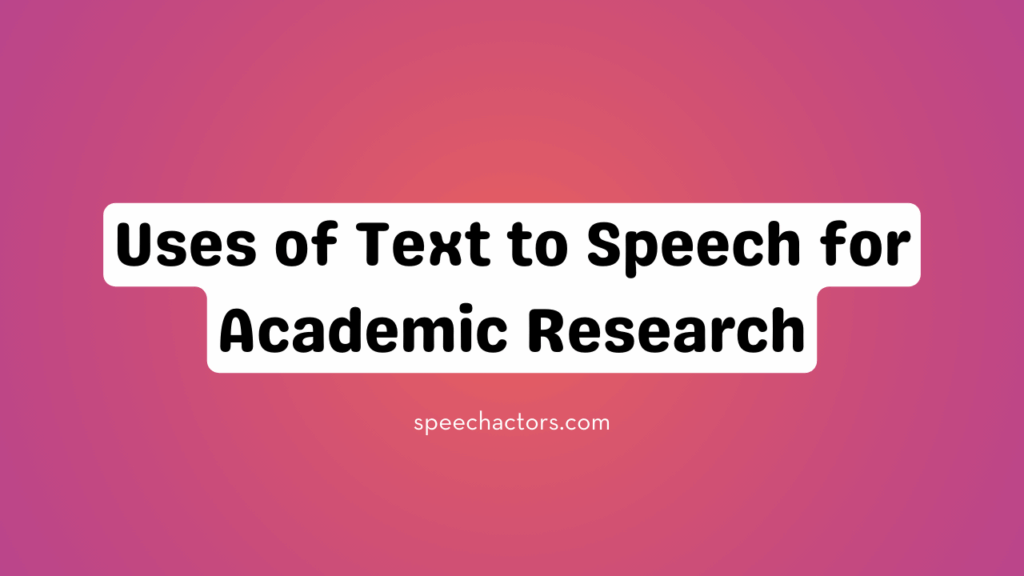Text-to-Speech (TTS) technology converts written text into natural-sounding audio, allowing researchers to listen to content instead of reading it. In academic research, efficiency and accessibility are essential, as scholars often handle large volumes of papers, journals, and reports. TTS supports researchers by transforming text into speech, making reading and comprehension faster and more flexible.
Listening to articles while multitasking or revisiting complex concepts enhances focus and retention. By integrating TTS into their workflow, researchers can streamline study sessions, absorb information effectively, and make academic work more accessible and productive.
Role of TTS in Academic Research
Text-to-Speech (TTS) plays a valuable role in academic research by turning research papers, articles, and notes into clear audio. This allows researchers to listen while traveling, exercising, or handling other tasks, making multitasking easier and more productive.
TTS also supports auditory learning, helping many people retain complex concepts better when heard rather than read. Furthermore, it provides accessibility for researchers with reading difficulties or visual impairments, ensuring equal participation in academic work.
By blending technology with study routines, TTS makes research more inclusive, engaging, and convenient for learners and professionals across different fields.
Enhancing Productivity and Focus with TTS
Enhancing productivity and focus with TTS becomes easy when you let technology handle the reading for you. Listening to long documents saves valuable time and allows you to absorb information while multitasking.
It turns heavy reading into a smooth flow of words that keeps your mind engaged. Additionally, hearing the content helps highlight key points and improves memory retention, making it easier to recall later.
Furthermore, using TTS for proofreading brings clarity by catching errors that silent reading might miss. This process strengthens focus, improves accuracy, and ensures better results while working with written content.
Integrating TTS into Research Workflow
Integrating TTS into your research workflow turns heavy reading into flexible, voice first work. Speechactors stands out for lifelike voices and batch reading of PDFs, web pages, and notes. Other reliable options include Microsoft Edge Read Aloud, NaturalReader, Amazon Polly, and Google Cloud Text to Speech.
Pair TTS with note tools such as Notion, Obsidian, Evernote, OneNote, and Readwise to capture highlights, sync clippings, and keep key paragraphs. Add AI summarizers like Zotero with Note Templates, or readers with summary modes, to create quick abstracts and literature maps.
In collaborative projects, teams share playlists of readings, maintain shared Notion or Google Docs with timestamps and voice settings, and run audio-based check-ins so everyone reviews the same narrated sections.
Benefits of Using Speechactors for Academic Research
Speechactors makes academic research easier by offering natural, high-quality voices that help listeners clearly understand complex material. Researchers can customize playback speed and choose from different voice options, making it simple to adjust listening to their study pace.
Additionally, its multilingual support allows access to global research material, helping users explore content beyond language barriers. Speechactors also integrates smoothly with academic platforms and workflows, so researchers can listen to lectures, papers, or notes without breaking their routine.
These features create a more accessible and engaging way to absorb knowledge, making academic research more effective and enjoyable in everyday use.
Challenges and Best Practices
Using Text-to-Speech (TTS) in research often brings common challenges such as pronunciation issues, technical setup, and maintaining focus when voices become too engaging. These hurdles are natural but can be managed with the right practices.
Optimizing TTS use in research means selecting clear voices, adjusting playback speed, and aligning the tool with specific study needs for better comprehension.
Ensuring accessibility and inclusivity is equally important, as TTS allows people with different abilities to fully participate in research activities. When integrated thoughtfully, TTS enhances focus, improves information retention, and creates a more inclusive learning and research environment.
Future Trends: TTS in Academic Research
TTS in Academic Research is moving toward smart, context-aware narration. Imagine listening while you annotate or commute. AI-driven voices tailored for research applications will pronounce domain terms precisely, modulate pace for dense math, and shift tone across abstracts, methods, and results.
Readers will track complex figures through synchronized captions and audio cues, improving comprehension. Multilingual teams will share findings via real-time voice translation, strengthening collaboration. Lab notebooks, protocols, and datasets will speak as interactive audio, accelerating literature reviews and routine tasks.
Personal voice profiles will align speed, pitch, and emphasis with each scholar’s preferences, boosting efficiency. Voice APIs will connect with reference managers and ELNs, enabling seamless, voice-first research workflows.
Frequently Asked Questions (FAQs)
How can TTS save time for researchers?
TTS reads research papers aloud, letting researchers listen while multitasking. Studies show listening can be 1.5× faster than reading, helping save hours on long documents.
Is TTS suitable for all types of research documents?
TTS works for journals, articles, reports, and ebooks. It handles technical terms and data tables clearly, making complex research easier to follow without skipping details.
Can TTS improve accessibility in academic research?
TTS makes research accessible for visually impaired and dyslexic users. Universities report increased engagement and comprehension when students use TTS for study materials.
What makes Speechactors a reliable TTS tool for researchers?
Speechactors provides natural, high-quality voices, precise pronunciation of technical terms, and multi-language support, ensuring accurate, professional audio for academic work.
Can TTS improve understanding and retention of complex material?
Listening with TTS reinforces memory, as studies show that combining audio with visual reading improves retention by up to 60%, helping researchers grasp difficult concepts faster.
Conclusion
Text-to-Speech technology is transforming academic research by enhancing comprehension, saving time, and improving accessibility. From reviewing lengthy papers aloud to multitasking efficiently, TTS empowers researchers to process information smarter and faster.
By integrating TTS into your daily workflow, you can elevate focus, retention, and productivity, making research less tedious and more effective. Explore Speechactors to experience high-quality, customizable voices designed to support academic research and unlock a seamless reading and learning experience that keeps you ahead in your field.
